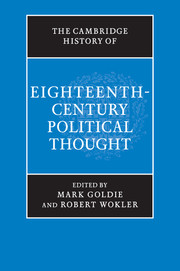Book contents
- Frontmatter
- Introduction
- Part I The ancien régime and its critics
- Part II The new light of reason
- Part III Natural jurisprudence and the science of legislation
- Part IV Commerce, luxury, and political economy
- Part V The promotion of public happiness
- Part VI The Enlightenment and revolution
- 21 The American Revolution
- 22 Political languages of the French Revolution
- 23 British radicalism and the anti-Jacobins
- 24 Ideology and the origins of social science
- Biographies
- Bibliography
- Index
23 - British radicalism and the anti-Jacobins
from Part VI - The Enlightenment and revolution
Published online by Cambridge University Press: 28 March 2008
- Frontmatter
- Introduction
- Part I The ancien régime and its critics
- Part II The new light of reason
- Part III Natural jurisprudence and the science of legislation
- Part IV Commerce, luxury, and political economy
- Part V The promotion of public happiness
- Part VI The Enlightenment and revolution
- 21 The American Revolution
- 22 Political languages of the French Revolution
- 23 British radicalism and the anti-Jacobins
- 24 Ideology and the origins of social science
- Biographies
- Bibliography
- Index
Summary
Nostalgia and modernity
British radicals of the later eighteenth century derived their ideas from the various ‘outs’ excluded from the Revolution Settlement of 1689 and the Whig triumph of the early Hanoverian era: the ‘Country’ Whigs and city Tories, the supporters of the ‘Good Old Cause’ disappointed by the half-revolution of 1688, the Dissenters, and the deists (Colley 1981; Dickinson 1977, ch. 6; Pocock 1985, ch. 11; Robbins 1959). It was during the controversies surrounding John Wilkes, the continued imposition of religious tests, the American War of Independence, and, most spectacularly, the French Revolution that radical ideas developed.
The languages used – versions of classical republicanism, ancient constitutionalism, natural jurisprudence and contract, Dissenting tolerationism, and millenarianism – had been well established in the conflicts of the seventeenth and early eighteenth centuries. In the context of a new political and economic order characterised by the growth of empire, a military establishment, the explosion of commerce and credit, a court-dominated Commons, urbanisation, rural enclosure, and a creeping if never secure secularism, such ‘radicalisms’ were dispositionally nostalgic (Pocock 1984, 1985, ch. 11). An important feature of the period is the attempt by radicals to accommodate their inherited patterns of thought to new and irreversible features of society and to the aspirations of the growing urban middle and lower orders. This involved integrating received vocabularies with those derived from the philosophical psychology wrought by Locke and elaborated by Hume and David Hartley, and with the largely Scottish development of political economy and historical sociology (Claeys 1990; Hampsher-Monk 1991; Pocock 1985, chs. 2, 11; ch. 15 above).
- Type
- Chapter
- Information
- The Cambridge History of Eighteenth-Century Political Thought , pp. 660 - 687Publisher: Cambridge University PressPrint publication year: 2006
- 6
- Cited by

